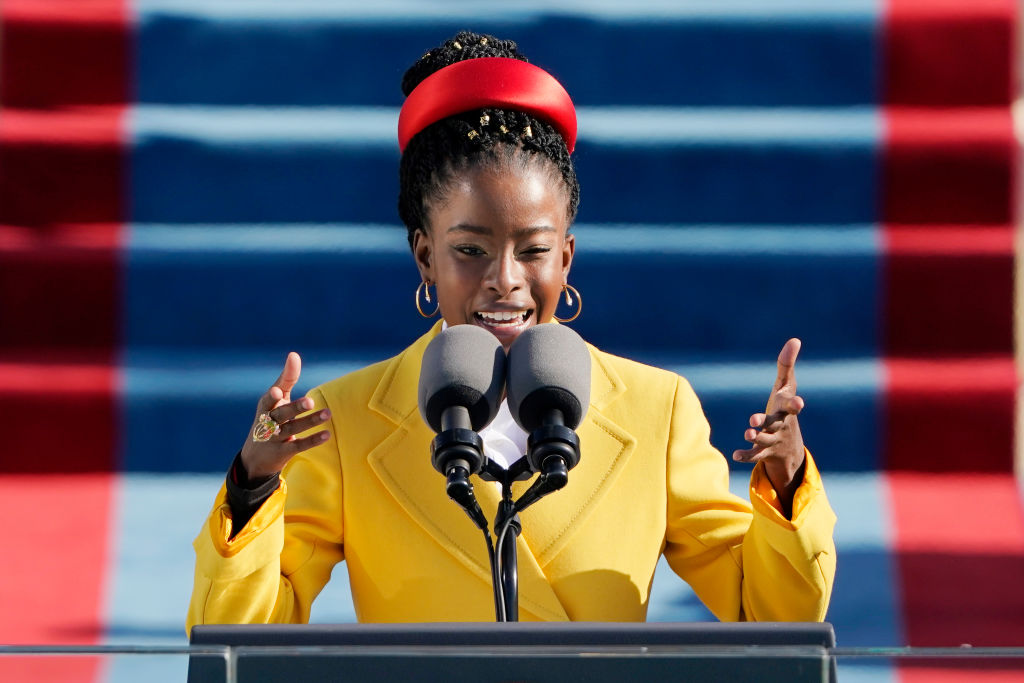She is the darling of the nation, the star of the inauguration, the first US National Youth Poet Laureate: she is Amanda Gorman, the person who serenaded America and the new president with a SLAM poem. Naturally, of course, Gorman’s poems have become best-sellers, and she was praised by just about everyone. Now though, she appears to have gotten lost in translation.
Gorman’s verse is stuffed with clichés, so you can’t imagine it would take a particularly good writer to translate her. But Dutch publisher Meulenhoff managed to find an International Man Booker-winner to do so: Marieke Lucas Rijneveld. Gorman herself approved of this decision. Now, though, the wisdom of the internet has spoken, and Rijneveld has resigned. Why? Because Rijneveld is white. And a black person, according to some activists, cannot be translated by someone who is white.
The first person to get worked up about this was Janice Deul. Writing in the Dutch paper de Volkskrant, Deul said that Rijneveld was not ‘a skinny Black girl’, as Gorman has called herself:
Deul’s criticism shows how little she knows about literature
‘(It is) an incomprehensible choice, in my view and that of many others who expressed their pain, frustration, anger and disappointment via social media…Isn’t it – to say the least – a missed opportunity to [have hired] Marieke Lucas Rijneveld for this job? They are white, nonbinary, have no experience in this field, but according to Meulenhoff are still the ‘dream translator’?’
But Deul’s criticism shows how little she knows about literature. Literature isn’t just about having experience, it’s about imagining it. Literature is the liberation of the imagination, not the segregation of the imagination, which is what Deul and her dunces are calling for.
What will they say next? Only black people can sing along to songs written by black people? Only mixed race people can watch a film featuring mixed race people? Can each race only read books written by their race? Critics like Deul are trying to trap us in our skin, trammel us in our race, imprison us in our bodies, make our skins our straightjackets. They want us to be (and only be) an identity category.
But when John Florio first translated Montaigne, had he ever been the baron of a French castle? When Scott Moncrieff first translated Proust, had he scoured the male brothels of Paris? Had he ever had a madeleine and felt his memory bloom? No and no, but that didn’t stop them producing two of the greatest translations in the English language. And what about the fact that William Tyndale and the other writers that would produce the King James Bible, the greatest translation ever, had never been to Palestine, or seen Jesus risen, or the Jews enslaved? Did that stop them? No, it didn’t.
Somebody might want to tell the great black writers, because they certainly didn’t get Deul’s memo. When Toni Morrison is writing about being onboard a slave-ship in Beloved, it is Faulkner who pops up, it is his terrifying matriarch, Addie Bundren, the queen of white trash, who haunts Morrison’s black underworld.
When Robert Hayden writes about slave-ships in ‘Middle Passage’, it is Hart Crane who pops up, it is his lily-white love-poems, ‘Voyages’, about homosexual sailors shagging and dying at sea, that gets mixed up with Hayden’s hideous cargo of black death and black love.
When James Baldwin wrote Giovanni’s Room, didn’t he take his epigraph from Walt Whitman, the big white bard? Wasn’t Langston Hughes also influenced by Walt Whitman? And when Toni Morrison came to write her dedication poem for The Black Book, didn’t she turn to Walt Whitman too for her model? That is to say, wasn’t The Black Book written, in part, by a white man?
This is literature. Literature is international, interracial. It brooks no categories. And it works both ways. Where would Heart of Darkness or On the Road be without their powerful blackness? Or Faulkner for that matter? Modern literature is ebony and ivory, they are interlaced, they are constantly translating one another. That is what it is to read and write. A book can make you poor, or rich, or black, or white, or gay, or straight, or polyamorous, or asexual, for as long as you’re sitting on that sofa and reading deeply, imaginatively. Deul and her dullards though want to flatter themselves that they can’t be translated. The truth is a lot simpler. A writer can translate anyone, and that is what makes them deadly.






Comments